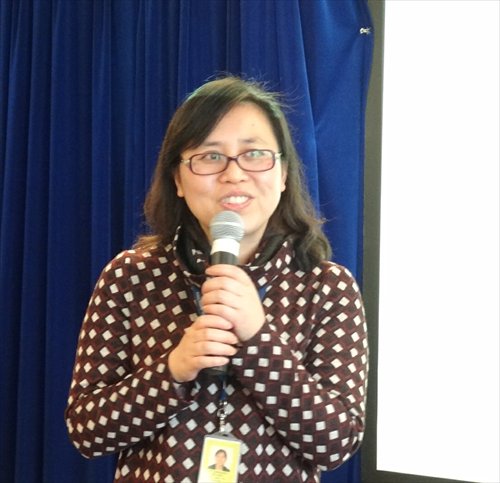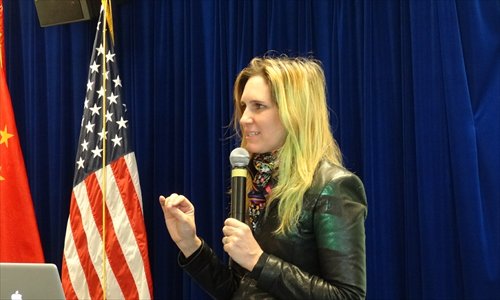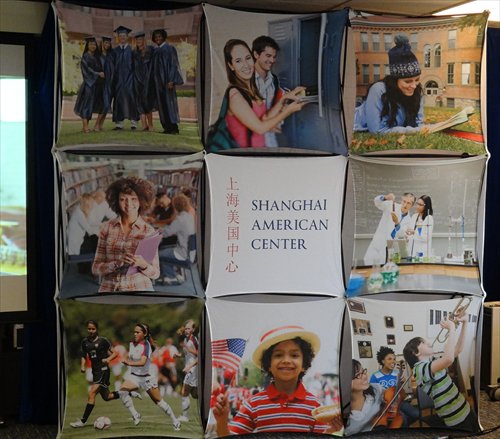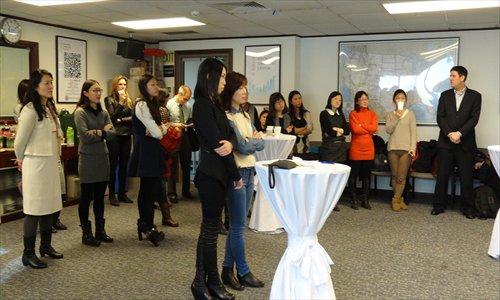HOME >> CHINA, METRO SHANGHAI
Mulling over internationalized education
By Yang Lan Source:Global Times Published: 2015-1-12 17:23:01
The US Consulate General in Shanghai hosted a New Year's party at the Shanghai American Center Thursday to ask representatives from international high schools, American universities, and other education specialists to offer their opinions on US-China cooperation in education last year.
At the party, Brantley Turner, the vice principal of Shanghai Qibao Dwight High School (Qibao Dwight), shared a story about Chinese-foreign educational cooperation.
Shanghai Qibao Dwight High School is a cooperatively run high school created by Shanghai Qibao High School and Dwight School in New York City, according to the school's website. Qibao Dwight, which opened September, has an International Baccalaureate Diploma Program and classes from the Chinese curriculum. If students meet all of the requirements and pass the examinations, they will receive one diploma from Shanghai Qibao Dwight High School and one from the Dwight School. Unlike other international schools in Shanghai, Qibao Dwight can grant graduates two diplomas. During winter break, a freshman from Qibao Dwight visited the US, but decided to stay longer. She asked Turner if she could study in the US instead of Qibao Dwight for one or two months.
The school always tries to help students meet their needs, Turner said. One solution is for the student to study at Dwight School in New York for a while. However, if she stays in the US for too long, she will miss many classes at Qibao Dwight and the upcoming geography examination, thus ineligible for a diploma from Qibao Dwight.
Hoping to find out if students choose to go to international high schools just to go to universities overseas or they also value the cooperative model, Turner asked the student: "If you miss one of the examinations, you will not obtain the diploma from Qibao Dwight. But you will still receive the diploma from Dwight New York. Will you give up our diploma?"
The student replied that her Chinese diploma was very important to her. She would find a way to keep studying geography for the exam during her stay at the US or take the examination next year.
From her response, Turner learned that Chinese students and their parents understood that going to a cooperatively run school did not mean they only cared about studying abroad in the future. They chose a cooperatively run school because they still valued the content that students learn at Chinese public schools.
Turner believes that the Chinese education, especially the education in Shanghai will continue to be desired by students. "We will never be like Shanghai American School, a totally American international school, because we do not believe that the internationalization of education means Westernization. We cherish the model of cooperation and we learn from each other," Turner said at the party.
As an American living in China for almost 20 years, Turner is happy to see that more Chinese students are studying in the US and more American students are studying in China.
Even though the school's Chinese and American staff members get along well, Turner remains concerned that the students still have a long way to go to completely understand different cultures and the different ways of seeing the world.
Her concern was heard by the educators. More and more US universities are setting up offices in China. The China office of the University of Virginia will open in Shanghai in March.
"In May, EducationUSA will organize the second High School Guidance Training. I hope that you can all join us and share the information with those who want to come," Yu Minjian, the senior education specialist from EducationUSA China said at the event.
As the official agency supported by the U.S. Department of State's Bureau of Educational and Cultural Affairs, EducationUSA helps high school students learn more about American universities and get admitted into their ideal programs.
To educate Chinese students about US education, the Consulate General in Shanghai has been organizing four types of activities. The first type is lectures for students to learn about education in the US. The consulate also invites college recruitment officers to talk with students and parents about the ins and outs of college applications. Every June, it offers pre-departure orientations for students who have obtained visas to study in the US. The last type is experience sharing from students who have studied in the US and the American students who are currently studying in China, according to the Public Affairs Section of the US Consulate General in Shanghai.
A press release from the Public Affairs Section of the US Embassy in Beijing shows that the number of Chinese students enrolled in US institutions of higher education in the 2013 academic year rose by 16.5 percent annually to 274,439.




At the party, Brantley Turner, the vice principal of Shanghai Qibao Dwight High School (Qibao Dwight), shared a story about Chinese-foreign educational cooperation.
Shanghai Qibao Dwight High School is a cooperatively run high school created by Shanghai Qibao High School and Dwight School in New York City, according to the school's website. Qibao Dwight, which opened September, has an International Baccalaureate Diploma Program and classes from the Chinese curriculum. If students meet all of the requirements and pass the examinations, they will receive one diploma from Shanghai Qibao Dwight High School and one from the Dwight School. Unlike other international schools in Shanghai, Qibao Dwight can grant graduates two diplomas. During winter break, a freshman from Qibao Dwight visited the US, but decided to stay longer. She asked Turner if she could study in the US instead of Qibao Dwight for one or two months.
The school always tries to help students meet their needs, Turner said. One solution is for the student to study at Dwight School in New York for a while. However, if she stays in the US for too long, she will miss many classes at Qibao Dwight and the upcoming geography examination, thus ineligible for a diploma from Qibao Dwight.
Hoping to find out if students choose to go to international high schools just to go to universities overseas or they also value the cooperative model, Turner asked the student: "If you miss one of the examinations, you will not obtain the diploma from Qibao Dwight. But you will still receive the diploma from Dwight New York. Will you give up our diploma?"
The student replied that her Chinese diploma was very important to her. She would find a way to keep studying geography for the exam during her stay at the US or take the examination next year.
From her response, Turner learned that Chinese students and their parents understood that going to a cooperatively run school did not mean they only cared about studying abroad in the future. They chose a cooperatively run school because they still valued the content that students learn at Chinese public schools.
Turner believes that the Chinese education, especially the education in Shanghai will continue to be desired by students. "We will never be like Shanghai American School, a totally American international school, because we do not believe that the internationalization of education means Westernization. We cherish the model of cooperation and we learn from each other," Turner said at the party.
As an American living in China for almost 20 years, Turner is happy to see that more Chinese students are studying in the US and more American students are studying in China.
Even though the school's Chinese and American staff members get along well, Turner remains concerned that the students still have a long way to go to completely understand different cultures and the different ways of seeing the world.
Her concern was heard by the educators. More and more US universities are setting up offices in China. The China office of the University of Virginia will open in Shanghai in March.
"In May, EducationUSA will organize the second High School Guidance Training. I hope that you can all join us and share the information with those who want to come," Yu Minjian, the senior education specialist from EducationUSA China said at the event.
As the official agency supported by the U.S. Department of State's Bureau of Educational and Cultural Affairs, EducationUSA helps high school students learn more about American universities and get admitted into their ideal programs.
To educate Chinese students about US education, the Consulate General in Shanghai has been organizing four types of activities. The first type is lectures for students to learn about education in the US. The consulate also invites college recruitment officers to talk with students and parents about the ins and outs of college applications. Every June, it offers pre-departure orientations for students who have obtained visas to study in the US. The last type is experience sharing from students who have studied in the US and the American students who are currently studying in China, according to the Public Affairs Section of the US Consulate General in Shanghai.
A press release from the Public Affairs Section of the US Embassy in Beijing shows that the number of Chinese students enrolled in US institutions of higher education in the 2013 academic year rose by 16.5 percent annually to 274,439.

Yu Minjian, senior education specialist from EducationUSA China

Brantley Turner, the vice principal of Qibao Dwight

The Shanghai American Center at the US Consulate General in Shanghai

Guests and participants at the event
Photos: Yang Lan/GT
Posted in: Society, Metro Shanghai